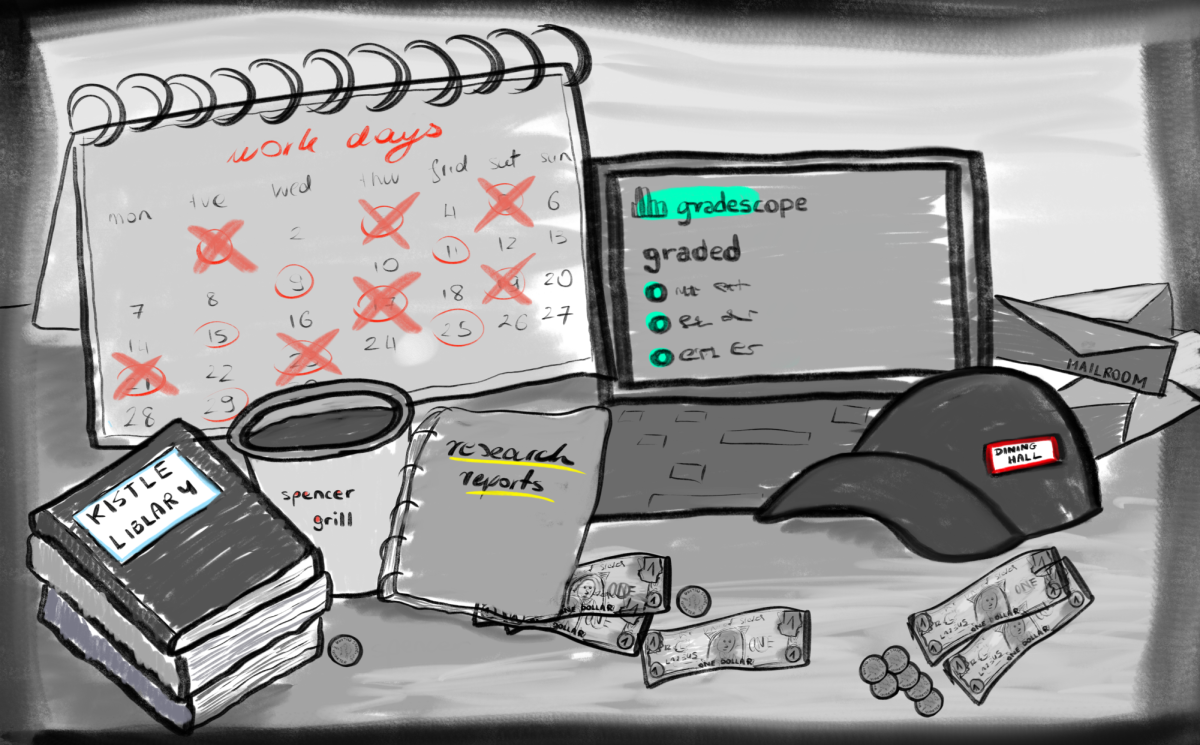Following a prolonged dispute with unionized student workers advocating for higher wages, Grinnell College has raised its minimum campus wage this fall to $13 an hour – an increase of nearly five dollars more than the previous base wage. Student reactions remain varied and disparate.
Recently unionized Grinnell workers view the wage increase as the welcome result of great effort.
“I’m glad, and I think it’s a long time overdue that student workers be paid more,” said Lena Wiebe `25, president of the Union of Grinnell Student Dining Workers (UGSDW). “I genuinely think there’s a major material difference that I think is positive. I think it’s the result of a lot of student workers’ hard work and really pushing for that for years and years and years,” she said.
A provision to increase the new minimum wage by 27 cents for each of the next three academic years has been included in the College’s latest comprehensive wage proposal.
According to Wiebe, however, the implementation of the new wage structure has not gone perfectly. “What I think is unfortunate is that the College has apparently made this change completely independent of consultation or negotiation with any student workers at all.”
Wiebe continued, “It’s crucial that as workers, we’re talking to one another and also that we’re building power to make sure we’re getting things we know we need and have been saying we need for a long time.”
Previous Union bargaining proposals included stipulations for a minimum wage increase to at least $15 dollars an hour.
A shift in library staffing is another example of how the wage structure has changed student employment on campus. There are no longer any student workers at Kistle Science Library.
The overall number of student workers at Burling Library has decreased from 33 during last spring to only 17 this fall. The S&B reached out to several of these workers for this story and they chose not to comment or respond.
Asked about these staffing changes, Vice President of Marketing Ellen de Graffenreid, provided some context from her and the College’s perspective. “While many departments try to hire the same students from semester-to-semester or year-to-year for continuity, departments can, and often do, have changing needs over the course of the year or make changes to processes to improve service,” wrote de Graffenreid in an email to the S&B. “An example of service improvements is the Libraries’ decision to install self-checkout technology in Kistle Science Library so that students have access to materials during expanded hours.”
De Graffenreid explained that the implementation of the new minimum wage, and its effects on department budgets for student workers, is an ongoing process. Department requests for supplemental student wage funds are not due until September 15, said de Graffenreid, “so we don’t yet have an accurate count of how many departments are asking for additional budget.”
Eamon Cole `25 has seen his position as a Science Community Leader (SCL) change significantly. Last year, he was able to spend up to seven hours a week on mentoring and assisting students with organic chemistry class. “To be most effective at your job,” Cole said, “you should spend more time preparing.” Cole said he used to prepare for SCL sessions by creating worksheets and practice quizzes for his students.
Now that his hours are capped at 5.5 per week, however, he finds that there is less time to adequately prepare for the best SCL meetings. “This semester I don’t think I’m going to be able to do that,” Cole said.
Student worker hours have also been reduced elsewhere on campus. According to Toby Frick `24, one of the head lifeguards, the Russell K. Osgood Natatorium has cut those hours by 40 percent.
In effect, the natatorium now has reduced morning and weekend hours. “Grinnell community members use this time to exercise before they go to work, so it means these people aren’t able to use the pool anymore,” said Frick. “I’m frustrated that the community members can’t swim and that students have less hours.”
Student workers at the Dining Hall have noticed a variety of changes since the raise in the minimum campus wage. So far, according to Vivian Santillo `25, the number of student workers is the most she has seen in her semesters working there. “I wouldn’t say it’s overstaffed, but it feels overstaffed,” she said.
Given her experience as a student leader in the Dining Hall, Santillo views the wage increase as more of a double-edged sword than expected. Although student leaders used to earn more than less experienced student workers, that no longer is the case. “That’s kind of a downside because it decreases incentive to want to become in a leadership role,” she said.
According to Wiebe, who has spoken with dozens of student workers about their work experiences this semester, “the way it’s [the wage increase] affected people in different workplaces is extremely variable.”
Correction: This article was corrected to reflect that department requests for supplemental student wage funds are in fact due on September 15, rather than department budgets. The source of the 27 cents hike provision over three years has been added for accuracy. This article incorrectly stated the new minimum wage to be $13.25 rather than $13. The prior figure refers to a stipulation in the recent proposal instead.

















































